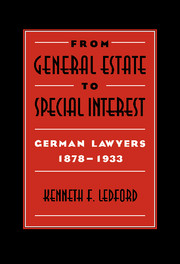Book contents
- Frontmatter
- Contents
- List of Illustrations
- Hierarchy of Courts
- Glossary of Legal and Other Terms
- Abbreviations
- Preface
- 1 The Archimedean Point: Lawyers, Liberalism, and the Middle-Class Project
- 2 Freie Advokatur: The Blending of the Middle-Class and Professional Projects
- 3 Foundation of the Modern Profession: The Private Bar under the Lawyers' Statute
- 4 Institutional Framework: Lawyers and Honoratiorenpolitik
- 5 Growth and Diversification: Lawyers in the Province of Hannover, 1878–1933
- 6 Elites and Professional Ideology: Self-Discipline and Self-Administration by the Anwaltskammer Celle
- 7 Simultaneous Admission: The Limits of Honoratiorenpolitik
- 8 The Limits of Economic Liberalism: Freie Advokatur or Numerus Clausus?
- 9 The Limits of Political Liberalism: Lawyers and the Weimar State
- 10 Conclusion: Lawyers and the Limits of Liberalism
- Methodological Appendix
- Bibliography
- Index
10 - Conclusion: Lawyers and the Limits of Liberalism
Published online by Cambridge University Press: 11 September 2009
- Frontmatter
- Contents
- List of Illustrations
- Hierarchy of Courts
- Glossary of Legal and Other Terms
- Abbreviations
- Preface
- 1 The Archimedean Point: Lawyers, Liberalism, and the Middle-Class Project
- 2 Freie Advokatur: The Blending of the Middle-Class and Professional Projects
- 3 Foundation of the Modern Profession: The Private Bar under the Lawyers' Statute
- 4 Institutional Framework: Lawyers and Honoratiorenpolitik
- 5 Growth and Diversification: Lawyers in the Province of Hannover, 1878–1933
- 6 Elites and Professional Ideology: Self-Discipline and Self-Administration by the Anwaltskammer Celle
- 7 Simultaneous Admission: The Limits of Honoratiorenpolitik
- 8 The Limits of Economic Liberalism: Freie Advokatur or Numerus Clausus?
- 9 The Limits of Political Liberalism: Lawyers and the Weimar State
- 10 Conclusion: Lawyers and the Limits of Liberalism
- Methodological Appendix
- Bibliography
- Index
Summary
On Saturday afternoon, 22 April 1933, members of the lawyers' chamber for the Court of Appeal district of Celle convened at 3:00 p.m. in the city of Hannover for a special meeting to elect a new executive board. This extraordinary and irregular assembly met at the order of the Prussian Ministry of Justice in Berlin, controlled since 30 January by the National Socialist Party. On 3 April the sitting executive board had refused the ministry's demand to resign en masse, and it had further declined to accept the tendered resignation of its single Jewish member, “in consideration of [his] long years of meritorious service.” As a result, the ministry of justice had deposed the executive board and appointed a local National Socialist lawyer, Focko Meiborg, as “Commissar” to run the lawyers' chamber until the 22 April meeting could be held to choose a new board that would presumably be more willing to “take its part in the fulfillment of the great tasks that face the administration of justice in the new state.”
At the express order of the justice minister, the assembly was open to the public, and in the intimidating presence of a large number of SA brownshirts who lined the back of the room where the meeting was held, the members of the lawyers' chamber elected a National Socialist-dominated slate, chaired by Meiborg.
- Type
- Chapter
- Information
- From General Estate to Special InterestGerman Lawyers 1878–1933, pp. 291 - 300Publisher: Cambridge University PressPrint publication year: 1996



